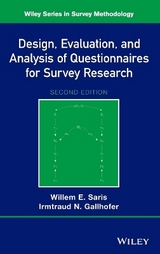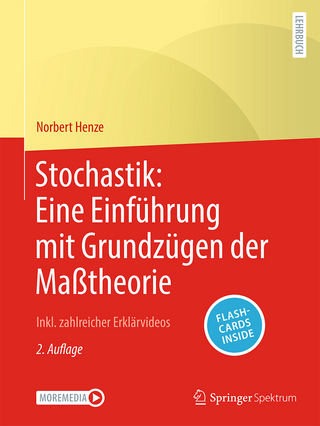
Design, Evaluation, and Analysis of Questionnaires for Survey Research
Wiley-Blackwell (Verlag)
9780470114957 (ISBN)
- Titel ist leider vergriffen;
keine Neuauflage - Artikel merken
Co-developed by the authors, this one-of-a-kind software is available via the book's related Web site and provides a valuable resource that allows researchers to estimate a questionnaire's level of quality before its distribution. In addition to carefully outlining the criteria for high quality survey questions, this book also:* Defines a three-step procedure for generating questions that measure, with high certainty, the concept defined by the researcher* Analyzes and details the results of studies that used Multitrait-Multimethod (MTMM) experiments to estimate the reliability and validity of questions* Provides information to correct measurement error in survey results, with a chapter focusing specifically on cross-cultural research* Features practical examples that illustrate the pitfalls of traditional questionnaire design* Includes exercises that both demonstrate the methodology and help readers master the presented techniques Design, Evaluation, and Analysis of Questionnaires for Survey Research succeeds in illustrating how questionnaire design influences the overall quality of empirical research.
With an emphasis on a deliberate and scientific approach to developing questionnaires, this book is an excellent text for upper-level undergraduate or beginning graduate-level survey research courses in business and the social sciences, and it also serves as a self-contained reference for survey researchers in any field.
Willem E. Saris is Professor at Escuela Superior de Administracion y Direccion de Empresas (ESADE) in Barcelona, Spain. He was Laureate of the 2005 Descartes Prize for Best Collaborative Research and has over thirty years of teaching experience in the field of survey methodology. Irmtraud N. Gallhofer is Senior Researcher of projects for the European Social Survey (ESS) at ESADE in Barcelona, Spain. The recipient of the 2005 Descartes Prize for Best Collaborative Research, she has extensive teaching and research experience in text analysis and has been an invited lecturer at numerous universities.
Preface. Introduction. PART I. THE THREE STEPS PROCEDURE TO DESIGN REQUESTS FOR AN ANSWER. 1. Concepts-by-postulation and concepts-by-intuition. 2. From social science concepts-by-intuition to assertions. 3. The formulation of requests for an answer. PART II. CHOICES INVOLVED IN QUESTIONNAIRE DESIGN. 4. Specific survey research features of requests for an answer. 5. Response alternatives. 6. The structure of open ended and closed survey items. 7. Survey items in batteries. 8. Mode of data collection and other choices. PART III. THE EFFECTS OF SURVEY CHARACTERISTICS ON DATA QUALITY. 9. Criteria for the quality of survey measures. 10. The estimation of reliability, validity and method effects. 11. The split ballot MTMM designs. 12. The estimation of the effects of measurement characteristics on the quality of survey questions. PART IV. APPLICATIONS IN SOCIAL SCIENCE RESEARCH. 13. The prediction and improvement of survey requests by SQP. 14. The quality of measures for concepts-by-postulation. 15. Correction for measurement error in survey data analysis. 16. Coping with measurement error in cross-cultural research. References. Index.
| Erscheint lt. Verlag | 24.8.2007 |
|---|---|
| Reihe/Serie | Wiley-Interscience | Wiley Series in Survey Methodology |
| Zusatzinfo | Illustrations |
| Verlagsort | Hoboken |
| Sprache | englisch |
| Maße | 161 x 242 mm |
| Gewicht | 670 g |
| Einbandart | gebunden |
| Themenwelt | Mathematik / Informatik ► Mathematik ► Wahrscheinlichkeit / Kombinatorik |
| Sozialwissenschaften ► Soziologie ► Empirische Sozialforschung | |
| ISBN-13 | 9780470114957 / 9780470114957 |
| Zustand | Neuware |
| Informationen gemäß Produktsicherheitsverordnung (GPSR) | |
| Haben Sie eine Frage zum Produkt? |
aus dem Bereich



